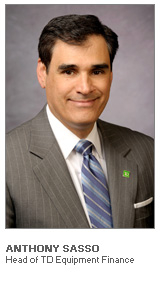
If one were to consider the terms that best describe the mindset of business investment decision makers and in turn, professionals in the equipment finance space, the term uncertain would without a doubt make it to the top ten. And the same descriptive holds true not only in equipment finance, but for economists and the global economy as well. In mid-December 2012, TD Economics issued its Quarterly Economic Outlook for the U.S. The report’s title -- Trying to Take Off, But Fiscal Uncertainty is Blocking the Way-- says it all. To find out more about this economic block and its effect on the industry, Equipment Finance Advisor spent some time with Anthony Sasso, Head of TD Equipment Finance and Martin Schwerdtfeger, senior economist at TD Economics.
Did uncertainty surrounding the outcome of the presidential election and the possibility a leap off the fiscal cliff in fact suppress business investment in 2012 in actuality? Sasso says, “I would say that overall, our experience was favorable in 2012. At TD Equipment Finance, we saw an increase in volume across nearly all of our business segments in TD Equipment Finance.”
 Perhaps not surprisingly, Sasso notes the exception was in the Federal Leasing sector. He adds “While we saw a year-over-year increase in volume, the prospects of an automatic budget reduction or sequestration did cause many contracting officers to take a pause. We did see somewhat of a slowdown in our pipeline activity in the third and fourth quarter. But since we avoided the fiscal cliff, we’ve already seen some momentum in terms of inquiries for financing opportunities in that space.”
Perhaps not surprisingly, Sasso notes the exception was in the Federal Leasing sector. He adds “While we saw a year-over-year increase in volume, the prospects of an automatic budget reduction or sequestration did cause many contracting officers to take a pause. We did see somewhat of a slowdown in our pipeline activity in the third and fourth quarter. But since we avoided the fiscal cliff, we’ve already seen some momentum in terms of inquiries for financing opportunities in that space.”
And in spite of the eleventh hour deal reached by Congress and the Administration, the cloud of uncertainty continues to hover. On the economic front, Schwerdtfeger notes, “Given that sequestration is still an ongoing issue, this will continue to have an impact on economic activity depending on how it is ultimately resolved. Our estimate in the December forecast noted we estimated a fiscal drag of around 1.5% of GDP and that has been lessened somewhat since the reached agreement. But we still have significant uncertainty right now on the final impact of fiscal policy on economic activity.”
Setting the uncertainty aside, Sasso is quick to note that for the equipment finance industry, the approval of bonus depreciation was the most significant item up for grabs in the end-of-year negotiations. “That’s definitely a strong positive … the continuation of bonus depreciation going into 2013 is a huge plus. And from my vantage point, I think we’ll see a continuation of the momentum we had in 2012.”
When Sasso speaks of momentum, he speaks not only for TD Equipment Finance, but for the entire industry as well. He draws upon the conversations he had with his peers at last year’s Equipment Leasing and Finance Association’s Annual Convention in Palm Desert. “Most of the lessors I met with in California reported very robust increases in volume in 2012 as compared to 2011. I feel very good about the momentum of capital equipment spending continuing, which will benefit the equipment finance market significantly.”
Looking Forward & Eastward
 In terms of TD Equipment Finance’s footprint – the Eastern Seaboard from Maine to Florida and adjacent states – Schwerdtfeger says his team’s outlook is mixed. He explains, “Irrespective of what finally transpires with the U.S. fiscal situation and in the broadest sense, we think the Northeast – New England and the Mid-Atlantic will underperform in relative terms. And mostly that has to do with the story behind residential investment as well as some trends we’re seeing in the region’s manufacturing sector. We expect that to be weaker than the overall environment at the national level.”
In terms of TD Equipment Finance’s footprint – the Eastern Seaboard from Maine to Florida and adjacent states – Schwerdtfeger says his team’s outlook is mixed. He explains, “Irrespective of what finally transpires with the U.S. fiscal situation and in the broadest sense, we think the Northeast – New England and the Mid-Atlantic will underperform in relative terms. And mostly that has to do with the story behind residential investment as well as some trends we’re seeing in the region’s manufacturing sector. We expect that to be weaker than the overall environment at the national level.”
On the flip side, Schwerdtfeger notes, he expects the southern Atlantic states will outperform the national economy. He explains, “That has to do, at least in part, with strength in residential investment in states like Florida and Georgia and manufacturing activity in North and South Carolina.”
From the standpoint of industry sectors, it follows logically that construction, real estate and leasing activity will be the sectors that show more strength in terms of fixed investments in the southern Atlantic states. Schwerdtfeger adds, “On the other hand, the sectors that will continue to show greater weakness, or at least show a very tepid pace of expansion, will be in the financial and insurance sectors as well in other professional business services. Those will be the weakest prospects this year.”
As it relates to the relative good news from the housing sector of late, Sasso again is optimistic. “If I were to step back and really look at the housing market, strength in that sector has multiple effects. Certainly one of those effects is a boost in consumer confidence and of course, that drives a big portion of our economy. That provides an additional catalyst for spending, which in turn, bodes well for CEOs and CFOs continuing investing in plant and equipment.”
Persisting Uncertainty on the European Front
While attention of late has been focused on domestic fiscal issues, Schwerdtfeger contends that troubles in Europe are likely to resurface in coming months. He explains, “Europe still remains a major issue in terms of uncertainty because none of the fundamentals have changed. And I think that after the European Central Bank (ECB) announced it would be willing to purchase sovereign bonds, our attention shifted to the U.S. It’s almost as though we can only deal with one serious issue at a time.”
Schwerdtfeger expects that as the fiscal outlook crystallizes at home, troubles in the Eurozone will once again grab international attention. And, it’s a matter of timing. He notes, “By April, we will have Italian elections and that alone could be a catalyst for more turmoil in Europe. Prior to that, Greece will need another disbursement from the International Monetary Fund, the ECB and the European Union. Greece will need to undergo another review of its progress and likely discussions of write-downs of that country’s loans will follow. Then German elections will happen in September … the political elections in Europe are going to weigh heavily on the economic direction the Eurozone takes.”
As intricate as it all sounds, Schwerdtfeger asserts the situation in Europe is actually quite simple. “There is no fresh money to implant into those economies in either the public or private sectors. Until the reforms the Europeans are trying to implement begin to yield better economic outcomes, social conditions will continue to deteriorate and unemployment will continue to rise. All this will make it extremely difficult for economic activity to pick up. And we know from our experience in recent years in the U.S., even if the central bank remains extremely accommodative, without a demand for credit those measures make little difference.”
Super Storm Sandy: An Unwanted Visitor
The events surrounding last October’s Super Storm Sandy brought about both physical and financial devastation to key markets for TD Equipment Finance. In light of this, we asked Sasso to share the impact the storm had on TD Equipment Finance’s operations. He says, “You know, there was an added dynamic involved that many people may not be aware of. Sandy hit a few days before our fiscal year end of October 31 and we had many tax-related transactions that needed to close by then. The storm couldn’t have hit a worse time in terms of the fiscal year end.”
“I have to say, I’m very proud of people who the day after the storm hit, reported to work because they knew it was year-end … they knew our customers had to get these deals closed. Many of our employees had no power or heat. I can’t overemphasize the dedication of our people … we were up and running the next day as a result of our very robust contingency plans. It was unlike anything I’ve ever experienced in my professional career, but we got through it.”
Looking to the Future
Super Storm Sandy being a thing of the past, Sasso looks to 2013 with guarded optimism. “Opportunities in the space are there and barring any unforeseen event that could negatively impact capital spending, we’ll continue to see good momentum into 2013. But I will also add that 2013 is going to be a very competitive year.”
In today’s low interest rate environment, Sasso’s chief concern is the effect of margin compression. He emphasizes, “What I’m not seeing are the kinds of structural elements that don’t make sense as we had seen in the days prior to the recession. I’d hate to go back to the days where we’re competing over loosening structures. It isn’t a healthy environment. At the same time, we’re seeing deterioration on the margin side. But we had experienced this last year and we dealt with it very effectively. So, I think we’ll continue to work through this issue in 2013.”